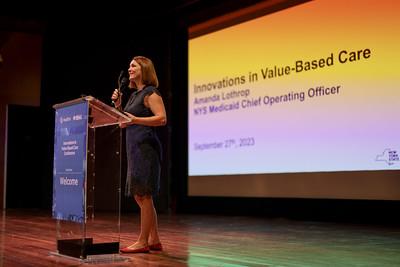Pending final approval, New York plans to introduce social care networks to serve regional Medicaid-enrolled organizations in the state.
New York Medicaid Chief Operating Officer Amanda Lothrop laid out these and other agency plans at a conference on value-based care held in New York City at the end of September. The state is currently finalizing the details of its 1115 Waiver amendment proposal with the Centers for Medicare & Medicaid Services, which is expected to infuse funds into population health, social care and workforce improvements.
The planned social care networks will be responsible for managing social needs screening, verifying the eligibility of members for health-related social needs services and generating a social care plan for them. The networks will be facilitated by a platform that connects the state, managed care organizations and community-based organizations (CBOs) to address social needs.
The state is expected to be granted three and a half years to set up and run the networks, in which time it hopes to prove out its belief that addressing social needs moves the needle on equity. “What we’re looking to do at scale across the state of New York is to have the data to support that,” Lothrop said in her presentation.
Each network will have a designated Medicaid provider overseeing fiscal administration, contracting, data collection, referral management and CBO capacity building in their region.
Referrals will be a closed loop so as to track outcomes before and after an intervention. Lothrop told Fierce Healthcare there is funding set aside to help onboard community-based organizations, which will need in-person training on whatever platform is ultimately selected. The platform must be extremely simple to use, such as a click of a button in an app, she explained.
The Medicaid plan in the state expects to soon open up a request for applications for a platform to facilitate the networks, after which they should be live within days.
The state’s Medicaid plan is also working with the Department of Health to revamp its value-based payment program, with the goal of addressing gaps in the current system, Lothrop said in her keynote speech. She praised value-based care as a tool to reduce health disparities and improve the quality of care.
Some of the new framework will be administrative work, like standardizing data for providers, while some will focus on narrowing health equity targets. “Stratify your population to look at the most vulnerable—where is there the biggest gap in your quality measures?” Lothrop said.

Many people not on Medicaid also need social care, Lothrop acknowledged. The plan hopes to set a foundation with its social care networks for other providers to then leverage for the commercial population.
Since this hasn’t been done at scale, Lothrop doesn’t know what the uptake will be or the most effective way to reach members.
“This is a pretty big guessing game,” she said in her presentation.
Conference speakers lay out the challenges, potential of value-based care
Other speakers throughout the conference—which was sponsored by Healthix and Helgerson Solutions Group (HSG) and hosted by City & State NY—emphasized the need to better integrate behavioral, social and physical care services.
“A great amount of the physical health expenses that a patient incurs are directly attributable to behavioral health issues along the way,” Glen Moller, CEO of Upward Health, said on a panel.
Yet behavioral health providers are not completely onboard to take on full risk, given their slim margins, noted Judy Kang, senior vice president of delivery system engagement at Healthfirst. The local payer finds it challenging to incentivize those types of providers to take total care of a member and still be profitable.

Demand in behavioral health also exceeds supply, adding to challenges the specialty faces in value-based care, Lothrop said. The 1115 Waiver does target patients with behavioral health needs to an extent and includes investments to grow the core workforce of providers. However, digital health broadly has potential in managed care and could be paired with a social care network for even more impact, per Lothrop.
Meanwhile, social needs data can be difficult, though critical, to ingrate. Such data are very different in and outside of the clinical context and require highly technical skills to mediate between the two, Unite Us co-founder and CEO Dan Brillman said. “It can’t happen just in one bucket or the other," he said.
At the same time, Zachariah Hennessey, executive VP and chief strategy officer of Public Health Solutions, cautioned about using the term social care, which may pathologize poverty. "There's nothing wrong with you," he said. "All you really need is help paying your rent." He emphasized the need to better leverage the expertise of CBOs and their status within communities to better include individuals' voices.
AI’s potential can’t be understated
Most panelists agreed that automation can revolutionize the sector. “The great power of mass customization has come to most industries,” Moller of Upward Health said.
Some commended AI for being able to help solve for the research-practice knowledge gap among providers. Others spoke about generative AI’s part in enabling smarter interactions between providers and software, like EHRs.
When it comes to patients, AI can also fulfill a critical role of helping manage patients between visits. The tool can keep track of patients’ symptoms, identify potential interventions and help escalate to treatment as needed. Such an approach can help providers more effectively manage care in value-based arrangements.
Thomas Novak, Medicaid interoperability lead at the Office of the National Coordinator for Health IT, cautioned against training AI models only on claims data.
Claims data are inexpensive and easy to get, Novak said. But many patients don’t generate a claim—like those that are unhoused, sick at home or avoiding hospitals. Thus, models trained only on claims data will be fundamentally inequitable, because they will exclude the most vulnerable patients.
In a similar vein, Verato’s senior product manager Sara Pesko highlighted the need to maintain the health of data. She encouraged organizations to establish a point person and central hub for solving problems as they arise. There should also be transparency around how patient data are being analyzed, she added.
